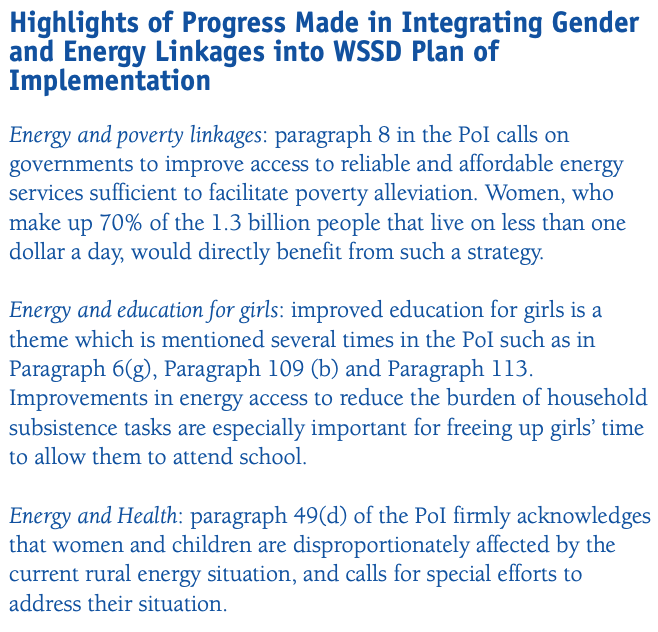The World Summit on Sustainable Development was held in Johannesburg, South Africa, from 26 August through 4 September 2002. With support from the Swedish International Development Assistance (Sida), ENERGIA undertook a leading role in mainstreaming gender and energy at WSSD.
Reinforcing our message with communications materials
To ensure the inclusion of gender in the decision-making process and WSSD negotiations, ENERGIA used different assets, including brochures and gender-related information materials, case studies in the form of regional papers and policy briefs written by ENERGIA members and partners. These informative materials served to reinforce ENERGIA’s message to integrate gender and energy into policies and projects.
Dissecting WSSD outcomes in a special edition of ENERGIA News
After the event, ENERGIA published an issue of ENERGIA News focused on the WSSD outcomes. Despite the recognition of gender equality as a basis for sustainable development, this concept failed to follow through into any of the discussions on the specific themes being addressed by the Summit, with the disappointing consequence of a Plan of Implementation (PoI) that was weak in addressing gender and energy questions.
The issue of ENERGIA News highlighted results, successes and some of the issues that the WSSD PoI could have tackled, such as policies to facilitate the uptake of appropriate energy technologies that would mitigate the poverty experienced by women, who as a group make up the majority of the world’s poor.
Successes
- Lobbying and advocacy activities at UN meetings leading up to the WSSD
ENERGIA and partners succeeded in achieving a wider recognition of gender and energy linkages in energy negotiations.
- Raising women’s voices in the energy conversation
With support from Swedish International Development Assistance (SIDA), ENERGIA played a leadership role in mainstreaming gender and energy at WSSD. As part of this initiative, ENERGIA was able to bring together an impressive group of gender and energy experts and advocates from four different regions, which increased the legitimacy and credibility of common messages. ENERGIA’s efforts in gender and energy advocacy in various forums, including those of the UN conferences, were acknowledged by the recognition of women as a “major group” and a representative from ENERGIA was also called upon to represent “women as a major group” in the discussion on energy during the UN plenary session. - Legitimizing the importance of gender in energy conversations
Among the strategies used to influence gender mainstreaming in the energy sector, ENERGIA focused on raising awareness and initiating a debate around the need to include gender in the negotiations. To do so, ENERGIA participated in and co-organized a number of events, including a side discussion during the WSSD, to make strong representations on the importance of gender sensitivity in energy planning, decision making and project implementation. ENERGIA worked together with the NGO Women’s Caucus, a working group of both women and men who are interested in, and working towards, the mainstreaming of gender in sustainable development policies and practical implementation strategies. ENERGIA presented language on gender and energy which was accepted by the Women’s Caucus for WSSD and incorporated in the statement delivered by the Caucus to the UN plenary.This was a great achievement, as one of the methods used to communicate the gender and energy message was indeed through an open plenary discussion moderated by a UN representative. This involved asking leading questions and picking one of the representatives of the major groups to answer. - Building partnerships to mobilize action
ENERGIA’s involvement in the Global Village Energy Partnership (GVEP) (now Energy 4 Impact) was crucial. GVEP was dedicated to reducing poverty and enhancing sustainable development by increasing access to modern energy services among the unserved and the under-served. It was launched at the WSSD by UNDP and the World Bank Energy Sector Management Assistance program (ESMAP). The partnership brought together governments from developing and industrialized countries, private firms, multilateral donor organizations, consumer groups, NGOs, research institutions, financial entities and other stakeholders. The presence of ENERGIA in the GVEP planning process at WSSD represented a window of opportunity to advocate for gender-sensitivity in energy policies and planning and to be involved in the implementation of those plans. - Strengthening our leadership role to convene, coordinate and engage
Despite weak political commitment to gender and energy in the WSSD Plan of Implementation, recommendations concerning appropriate government policies and project design provided by gender and energy advocates reinforced the need for gender sensitivity in energy planning and policy for sustainable development. There was a clear vision that the mobilization and engagement of a wide range of institutions, including international organizations, donor governments, government agencies, non-governmental organizations, the community and the private sector, in effective programs could bring progress in expanding energy access to women as well as men.
Follow us on: